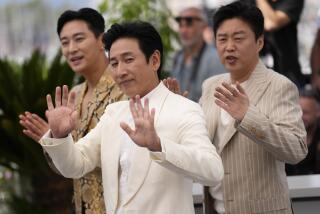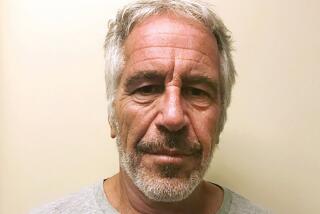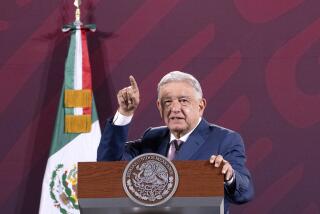Intrigue grows in case of ex-spy’s poisoning
Alexander Litvinenko, the former KGB agent at the center of an international poisoning mystery, was buried here Thursday, his body still so radioactive that health officials wouldn’t let it be displayed at a memorial service.
As friends and colleagues gathered to recite eulogies, sing hymns and, once again, denounce the Russian government -- which many blame for his death -- the intrigue picked up yet another layer: The Russian news agency Interfax announced that a key witness and possible suspect in the case had fallen into a coma in a Moscow hospital hours after being questioned by British investigators.
A lawyer involved in the case denied the report.
The witness, Russian businessman Dmitry Kovtun, appears to be the most gravely ill of a lengthening list of people contaminated by polonium-210, the radioactive isotope that British police think was used to kill Litvinenko last month.
As the investigation of Litvinenko’s poisoning has progressed, British police have remained silent on almost all questions.
One thing British authorities have spoken about openly is the discovery of traces of polonium-210 at many of the places visited by key players in the drama.
That includes a restaurant where Litvinenko, 43, lunched on sushi Nov. 1 while meeting one of his contacts, the Italian security consultant Mario Scaramella. The Italian has tested positive for “significant quantities” of polonium but appears to be in good health.
The venues also include the Pine Bar in the Millennium Hotel in London, where Litvinenko met for tea later that day with Kovtun and a second Russian businessman, Andrei Lugovoy. Lugovoy is hospitalized in Moscow and believed to be undergoing checks for radiation contamination.
Seven employees at the Pine Bar appear to have been exposed to low levels of polonium-210, prompting health authorities to invite customers to be tested for radiation.
“There’s no health risk in the short term. They’re not sick. In the long term, the risk is judged to be very small,” said Siovhan Leigh-Hunt, a spokeswoman for Britain’s Health Protection Agency.
The levels found in the bar employees were thought to be lower than those found in Litvinenko’s wife, who also has been contaminated but has shown no signs of illness.
As a “precautionary approach,” authorities are asking patrons who visited the bar Oct. 31 through Nov. 2 to come in for testing, Leigh-Hunt said.
The radiation fears extended to the memorial services Thursday, which were surrounded by their own controversies.
The disputes reflected the extent to which Litvinenko’s death had been seized on by many people who, for reasons of their own, have sought to use it as a rallying point in their individual battles with the Russian government.
The former spy’s father and a close friend, Akhmed Zakayev, an exiled Chechen separatist, said Litvinenko had converted to Islam during his final days. Other friends denied it.
Muslim friends arranged for a memorial service at London’s Central Mosque, where a few dozen mourners gathered for the Muslim funeral prayer.
From there, the body was taken for a second memorial at the chapel of London’s historic Highgate Cemetery, transported in a large oak coffin that was sealed on the advice of British health authorities to prevent radiation leakage.
At the cemetery, a much larger group of mourners gathered as a choir sang “There Is a Green Hill Far Away” and a hymn by Rachmaninov.
Russian billionaire Boris Berezovsky, who lives in London and was a close friend of Litvinenko, spoke of the “martyrdom” the former spy had achieved with the intense suffering that preceded his death.
“I can say that we are not vindictive, but we will not forget,” Berezovsky said, according to witnesses who were at the private ceremony.
The self-exiled billionaire is a fierce critic of Russian President Vladimir V. Putin. In a written statement prepared shortly before his death, Litvinenko accused Putin of ordering his killing, a charge the Kremlin has dismissed as “nonsense.”
At the graveside, near the burial spot of Karl Marx, Litvinenko’s friends and family members, determined to have a nondenominational service, were nonplused when a group of Muslim men, invited by Zakayev, arrived and began conducting Muslim prayers.
“They appeared uninvited and were a surprise to everybody,” said Alex Goldfarb, a friend of Litvinenko’s. He said Litvinenko’s widow, Marina, “who essentially was in deep mourning at that moment, faced a dilemma of whether to make it into a scene or just do nothing. She wisely decided to do nothing.”
Litvinenko lived for years in the North Caucasus near Chechnya. He sympathized with the Chechens and spent six years researching the Russian government’s wars in Chechnya, friends said.
“He wanted to be buried in Chechnya when the war was over,” said Vladimir Bukovsky, a well-known Soviet-era dissident who was exiled to Britain three decades ago.
“But he wasn’t a religious man. It’s ridiculous to talk about conversion. His last message from his deathbed was he asked God to forgive his enemies. That’s not a Muslim sentiment. That’s a Christian sentiment.”
Also Thursday, Russian authorities said they were opening their own investigation of the poisoning.
“Investigators ... may need to visit Britain for a complete and comprehensive investigation of this criminal case,” a spokesman for the Russian prosecutor’s office told the state-run news agency RIA Novosti.
“All the traces lead to Russia, and now that Scotland Yard investigators are already working on Russian soil, the Russian prosecutors need to know in full what the Brits already know -- for many reasons,” said Nikita Petrov, an expert on Russian history with the human rights organization Memorial.
The British Home Office said in a statement that it had not received a request for cooperation in a Russian-led investigation, but that if one came it “would be considered.”
Kovtun could be a key witness because he met with Litvinenko on the day of the poisoning and because his illness could indicate that he was heavily exposed to the radioactive substance.
He spoke with Russian and British investigators Wednesday, and was reported by Interfax to have fallen into a coma “almost immediately” afterward.
Interfax quoted an anonymous source saying that Kovtun “was able to give important evidence” to investigators before sinking into a coma, “after which the Russian investigators decided to institute criminal proceedings ... on attempted murder.”
The news agency also quoted an anonymous medical source as saying that “radioactive nuclides have hit Kovtun’s vital internal organs, in particular his liver and kidneys.”
RIA Novosti quoted Andrei Romashov, a lawyer for Lugovoy, as saying that Kovtun’s condition was satisfactory and that reports of his falling into a coma “can only be called a provocation.”
Interfax stood by its story.
kim.murphy@latimes.com
Holley reported from Moscow and Murphy from London. Times staff writer Sergei L. Loiko in Moscow contributed to this report.
*
(BEGIN TEXT OF INFOBOX)
The case of the poisoned ex-spy
Britain and Russia are investigating the death of former KGB agent Alexander Litvinenko. Who’s who in the case:
Alexander Litvinenko
Died Nov. 23 of radiation poisoning from polonium-210. Litvinenko had been investigating the Oct. 7 shooting death of Russian journalist Anna Politkovskaya.
Andrei Lugovoy
Former KGB agent and business associate of Dmitry Kovtun, both of whom met with Litvinenko at the Millennium Hotel in London on Nov. 1. Lugovoy also attended a soccer game at Emirates Stadium in North London.
Dmitry Kovtun
Possibly in a coma thought to be caused by radiation poisoning. He and Lugovoy met Litvinenko on Nov. 1. Considered a key witness and potential suspect.
Mario Scaramella
Italian security agent met with Litvinenko at a sushi restaurant Nov. 1 to warn him that they were in danger. Tested positive for polonium-210; released from hospital.
Yegor T. Gaidar
The former Russian prime minister became seriously ill in Ireland about a week after Litvinenko died. Doctors in Moscow do not know what caused his illness. Lugovoy once was a bodyguard for Gaidar.
Boris Berezovsky
A close friend of Litvinenko, the wealthy oligarch and critic of the Kremlin fled to Britain in 2000, was granted political asylum in 2003. Came to know Litvinenko after a failed assassination attempt on the businessman in 1994.
Anna Politkovskaya
Russian investigative journalist killed Oct. 7, whose death Litvinenko was investigating.
Sources: News reports. Graphics reporting by Julie Sheer
More to Read
Start your day right
Sign up for Essential California for news, features and recommendations from the L.A. Times and beyond in your inbox six days a week.
You may occasionally receive promotional content from the Los Angeles Times.





